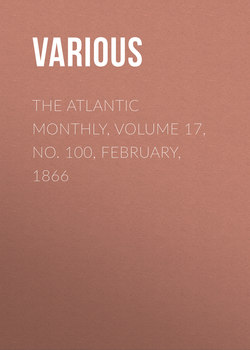Читать книгу The Atlantic Monthly, Volume 17, No. 100, February, 1866 - Various - Страница 3
THE FREEDMAN'S STORY
IN TWO PARTS
PART I
ОглавлениеThe manuscript of the following pages has been handed to me with the request that I would revise it for publication, or weave its facts into a story which should show the fitness of the Southern black for the exercise of the right of suffrage.
It is written in a fair, legible hand; its words are correctly spelled; its facts are clearly stated, and—in most instances—its sentences are properly constructed. Therefore it needs no revision. On reading it over carefully, I also discover that it is in itself a stronger argument for the manhood of the negro than any which could be adduced by one not himself a freedman; for it is the argument of facts, and facts are the most powerful logic. Therefore, if I were to imbed these facts in the mud of fiction, I should simply oblige the reader to dredge for the oyster, which in this narrative he has without the trouble of dredging, fresh and juicy as it came from the hand of Nature,—or rather, from the hand of one of Nature's noblemen,—and who, until he was thirty years of age, had never put two letters together.
The narrative is a plain and unpretending account of the life of a man whose own right arm—to use his own expression—won his rights as a freeman. It is written with the utmost simplicity, and has about it the verisimilitude which belongs to truth, and to truth only when told by one who has been a doer of the deeds and an actor in the scenes which he describes. It has the further rare merit of being written by one of the "despised race"; for none but a negro can fully and correctly depict negro life and character.
General Thomas—a Southern man, and a friend of the Southern negro—was once in conversation with a gentleman who has attained some reputation as a delineator of the black man, when a long, lean, "poor white man," then a scout in the Union army, approached the latter, and, giving his shoulder a familiar slap, accosted him with,—
"How are you, ole feller?"
The gentleman turned about, and forgetting, in his joy at meeting an old friend, the presence of this most dignified of our military men, responded to the salutation of the scout in an equally familiar and boisterous manner. General Thomas "smiled wickedly," and quietly remarked,—
"You seem to know each other."
"Know him!" exclaimed the scout. "Why, Gin'ral, I ha'n't seed him fur fourteen year; but I sh'u'd know him, ef his face war as black as it war one night when we went ter a nigger shindy tergether!"
The gentleman colored up to the roots of his hair, and stammered out,—
"That was in my boy days, General, when I was sowing my wild oats."
"Don't apologize, Sir," answered the General, "don't apologize; for I see that to your youthful habit of going to negro shindies we owe your truthful pictures of negro life."
And the General was right. Every man and woman who has essayed to depict the slave character has miserably failed, unless inoculated with the genuine spirit of the negro; and even those who have succeeded best have done only moderately well, because they have not had the negro nature. It is reserved to some black Shakspeare or Dickens to lay open the wonderful humor, pathos, poetry, and power which slumber in the negro's soul, and which now and then flash out like the fire from a thunder-cloud.
I do not mean to say that this black prophet has come in this narrative. He has not. This man is a doer, not a writer; though he gives us—particularly in the second part—touches of Nature, and little bits of description, which are perfectly inimitable. The prophet is still to come; and he will come. God never gives great events without great historians; and for all the patience and valor and heroic fortitude and self-sacrifice and long-suffering of the black man in this war, there will come a singer—and a black singer—who shall set his deeds to a music that will thrill the nations.
But I am holding the reader at the threshold.
The author of this narrative—of every line in it—is William Parker. He was an escaped slave, and the principal actor in the Christiana riot,—an occurrence which cost the Government of the United States fifty thousand dollars, embittered the relations of two "Sovereign States," aroused the North to the danger of the Fugitive-Slave Law, and, more than any other event, except the raid of John Brown, helped to precipitate the two sections into the mighty conflict which has just been decided on the battle-field.
Surely the man who aided towards such results must be a man, even if his complexion be that of the ace of spades; and what he says in relation to the events in which he was an actor, even if it have no romantic interest,—which, however, it has to an eminent degree,—must be an important contribution to the history of the time.
With these few remarks, I submit the evidence which he gives of the manhood of his race to that impartial grand-jury, the American people. E. K.
